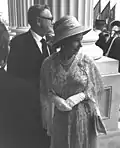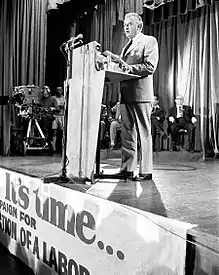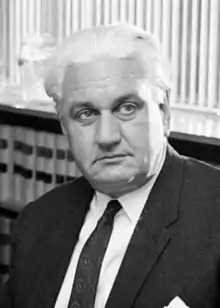Palace letters
The Palace letters, sometimes labelled as the Palace papers, refers to letters between Queen Elizabeth, through her private secretary, and Australian Governor-General Sir John Kerr around the time of the 1975 constitutional crisis, in which Kerr dismissed Australian Prime Minister Gough Whitlam.[1] The phrase 'Palace letters' originated in the work of Australian historian and Whitlam biographer Professor Jenny Hocking, who successfully overturned the Queen's embargo over these letters, as a reference to Buckingham Palace, the official residence of Queen Elizabeth in London.[2]



Kerr's copies of these letters are held by the National Archives of Australia, which would ordinarily have made them publicly accessible after 30 years as provided by the Archives Act. However, the National Archives classified them as "personal" papers, which meant that public access was denied according to an embargo placed over them by the Queen until at least 2027 and after that date until permitted by the Queen's private secretary.
In 2016 Professor Jenny Hocking, having been refused access to the letters, sued the National Archives for their release arguing that the letters were'Commonwealth records' not 'personal' and which should therefore be available for public access 31 years after their creation according to the provisions of the Archives Act 1983. In 2020, the High Court of Australia found in Hocking's favour and ruled that these documents should be accessible to the Australian public as Commonwealth records, and ordered the Director-General of the National Archives to reconsider Hocking's request.[3] The letters were made public, in full and online, on 14 July 2020.[4]
Background
In October 1975, the Opposition (Liberal/National-Country party coalition) used its control of the Australian Senate to defer passage of appropriation bills (needed to finance government expenditure), that had been passed by the Australian House of Representatives. The Opposition stated that they would continue their stance unless Whitlam called an election for the House of Representatives, subsequently urging Governor-General Sir John Kerr to dismiss Whitlam unless he agreed to their demand. Whitlam believed that Kerr would not dismiss him, and Kerr did nothing to disabuse Whitlam of this notion. On 11 November 1975, Whitlam intended to call a half-Senate election which was due at that time in an attempt to break the deadlock. When he went to Government House for an agreed meeting with Kerr to sign the final paperwork for the election, Kerr instead dismissed him as Prime Minister and shortly thereafter installed in his place Malcolm Fraser, the Leader of the Liberal Party of Australia and Leader of the Opposition.[5]
Queen Elizabeth and her Australian representative Governor-General Sir John Kerr exchanged more than 200 letters, which are now held in the National Archives of Australia. If they were Commonwealth records, they would ordinarily have been made public in 2006, 31 years after they were created.[6] However, the letters were designated 'personal' records and were under the embargo of the Queen until at least 2027, with either the Queen's private secretary or the Governor-General's official secretary able to veto the release of the letters thereafter.[6] Public access to the letters was therefore barred by the National Archives, which claimed that they were 'personal' papers and not Commonwealth records, and therefore did not come under the Australian Archives Act 1983.[3]
Legal challenge

In 2016 Hocking commenced proceedings in the Federal Court of Australia against the National Archives of Australia seeking the release of secret correspondence between Sir John Kerr and the Queen regarding the dismissal of the Whitlam government.
In 2020, Hocking revealed that there were more than 200 'Palace letters'.[7] They cover the bulk of Kerr's term in office, from 15 August 1974 to 5 December 1977, and it was an agreed fact in Hocking's Federal Court action that most of them "address topics relating to the official duties and responsibilities of the Governor-General" and some "take the form of reports to The Queen about the events of the day in Australia".[8] There had been a long debate regarding whether Queen Elizabeth might have known about the machinations of the dismissal, and it was thought that the contents of the 'Palace letters' could clarify and possibly settle that issue.[1][9]
The case was at first unsuccessful in the Federal Court and in February 2019 an appeal to the Full Court of the Federal Court was rejected by a majority.[10][11] In a strong dissenting judgment, Justice Flick found that the Palace letters were Commonwealth records and, further, that it was "difficult to conceive of documents which are more clearly 'Commonwealth records' and documents which are not 'personal' property" than the Palace letters. He described the letters as concerning "'political happenings' going to the very core of the democratic processes of this country".[12][13]
In January 2020, Sir Edward Young, Queen Elizabeth's private secretary stated a preference for "all vice-regal letters to remain sealed until at least five years after her reign ends and for him to maintain a sole veto on whether they should be released at all".[14]
On 29 May 2020 the High Court of Australia ruled that the Palace letters were not personal property but "Commonwealth records" and the property of the Commonwealth of Australia, and ordered the Director-General of the National Archives to reconsider Professor Hocking's request for access to the letters which it had previously denied.[15] National Archives Director-General David Fricker nevertheless indicated that "some records may not be released, as exemptions for things like national security still play a role".[1][16][3][17][18]
The letters were made public, in full and online, on 14 July 2020.[4][19]
References
- Byrne, Elizabeth (30 May 2020). "What did the Queen know about Gough Whitlam's dismissal? We might be about to find out". ABC News (Australia).
- Jenny Hocking Gough Whitlam: His Time p.412
- Hocking v Director-General of the National Archives of Australia [2020] HCA 19
- "The Kerr Palace Letters". National Archives of Australia. 14 July 2020. Retrieved 14 July 2020.
- Jenny Hocking Gough Whitlam: His Time MUP. 2012 pp330-332
- Staff, Our Foreign (2020-05-29). "Court rules release of Queen's secret 'Palace Letters' during dismissal of Gough Whitlam's Australian government". The Telegraph. ISSN 0307-1235. Retrieved 2020-05-29.
- Hocking, Jenny (16 April 2020). "'If I were to terminate his commission': Sir John Kerr's secret 'Palace letters on Whitlam's dismissal". Pearls & Irritations. Retrieved 13 July 2020.
- Hocking v Director-General of the National Archives of Australia [2019] FCAFC 12 at 46 (8 February 2019)
- "Queen Elizabeth's Letters, Which Could Address Controversial Dismissal of Australian Government, to Be Made Public". Time. Retrieved 2020-05-30.
- Hocking v Director-General of the National Archives of Australia [2019] FCAFC 12
- Hocking, Jenny (21 February 2019). "A national humiliation". Pearls and Irritations. Retrieved 23 February 2019.
- Hocking v Director-General of the National Archives of Australia [2019] FCAFC 12 at 110
- Hocking, Jenny (February 2020). "Archival secrets and hidden histories: reasserting the right to public access". Griffith Review. 67.
- Troy, Bramston (29 May 2020). "High Court was right to release John Kerr's correspondence with the Queen". The Australian.
- "Historian wins bid to read 'Palace letters' previously deemed 'private'". www.abc.net.au. 2020-05-28. Retrieved 2020-05-29.
- "Hocking v Director-General of the National Archives of Australia [2020] HCA 19" (PDF). High Court of Australia: Judgment Summaries. 29 May 2020. Retrieved 29 May 2020.
- Knaus, Christopher; Zhou, Naaman (29 May 2020). "Palace letters: high court ruling paves the way for release of Queen's secret correspondence before 1975 Whitlam dismissal". The Guardian. Retrieved 29 May 2020.
- Whitbourn, Michaela (29 May 2020). "High Court ruling favours release of 'Palace Papers' on Whitlam Dismissal". Sydney Morning Herald. Retrieved 29 May 2020.
- When the National Archives' website immediately crashed, the papers were also hosted in full on the website of The Guardian—Evershed, Nick (14 July 2020). "The 'palace letters': read the full documents from the national archives here". The Guardian. Retrieved 14 July 2020.
External links
- The Letters, hosted by the National Archives of Australia
- The Letters, provided by The Guardian
- The Letters in transcript, provided by the Sydney Morning Herald
